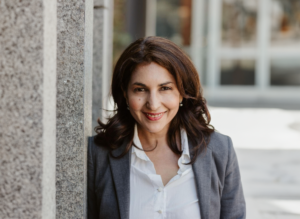Mackenzie Godson (2006): From Cultural Captain to Financial Controller

Mackenzie Godson (2006) initially aspired to excel in the field of science. However, her career trajectory took an unforeseen turn, leading her to a role in finance at one of the world’s largest consulting firms. She discusses the catalysts behind this transformation, delving into her commitment to using her financial expertise to aid the homeless, and articulates how students at Santa Maria College can actively contribute to resolving contemporary challenges within the financial sector.
Tell us about your time at Santa Maria. I noticed that you were a part of the Student Leadership Council (SLC). What was your role in the SLC?
I was at Santa Maria from Years 8 – 12, and was the Cultural Captain in my final year. At the time I had been studying French and Japanese, so I guess it made sense! Being in the SLC was probably part of my journey in realising that I had natural leadership qualities. I didn’t really understand why I’d wanted to be in a leadership role, but I thoroughly enjoyed it, and I think it probably helped me realise that I have some innate personality traits that lend themselves to management and leadership roles.
After graduating from Santa Maria, where did your journey take you?
After graduating, I immediately enrolled at university with the firm belief that I wanted to pursue a career in science. My Year 12 curriculum was loaded with TEE (ATAR) Science courses, and I embarked on a triple major Science degree, supplemented by a minor in Criminology (yes, I know, what was I thinking!). However, after a couple of years, I came to the realisation that science was not my true passion. Consequently, I made the decision to leave university and joined an engineering firm as a personal assistant to the Managing Director. This experience exposed me to the business world, and I found myself captivated.
Motivated by this newfound interest, I returned to university and switched to finance and accounting. I recognised a long-term career path in this field and pursued it diligently. In the second-to-last year of my Commerce degree, I undertook four different vacation work placements. Eventually, I selected a graduate role at PwC, where I spent eight years working in International Tax/Consulting across Perth, various parts of Asia, and Africa.
However, my journey took another turn when a client (Woodside) enticed me to join their tax team. In 2021, my partner’s job led us to a remote town in the Northern Territory, prompting me to leave my role at Woodside. Subsequently, I embraced a national/roaming role for a boutique accounting firm based in Brisbane. Over the next two years, I worked from various locations in Queensland, such as Brisbane, Townsville, Emerald, Mt Isa, Winton, and Boulia, extending all the way to Tennant Creek and Alice Springs in the Northern Territory. This experience exposed me to a different facet of the industry.
After this diverse journey, I made the decision to relocate to the Gold Coast in February of this year to work for a startup. Presently, my plan is to continue working with the team at the startup, which I thoroughly enjoy, and simultaneously launch my own business in the coming months. So, stay tuned for exciting developments!

As a financial controller, what are your main responsibilities in this role? Could you share a brief rundown of your tasks?
As a financial controller, my role revolves around monitoring the company’s financial health by overseeing all financial planning and analysis and implementing necessary changes. To put it in simpler terms, I am the person responsible for tracking the company’s profit, ensuring overall financial success, maintaining employee and client satisfaction, and ensuring compliance with government regulations. In the startup where I am employed, the responsibilities are essentially synonymous with those of a Chief Financial Officer (CFO), a term that is more commonly understood.
You served as the treasurer and board member of Street Law Centre. Could you share some insights into this organisation and its mission?
I have done a lot of work across various boards over the years, and I’ve observed a significant shortage of financial expertise on not-for-profit boards in Australia. I strongly encourage anyone interested in a career in commerce to consider contributing to such boards, as the impact can be profound.
Street Law is a free legal service for the homeless and those at risk of homelessness. In essence, it comprises a group of lawyers who provide legal services to individuals in society unable to afford such services. Many of the cases involve women in domestic violence relationships who leave their partners but find themselves with nothing. These individuals lack the financial means for proper legal representation, and that’s where Street Law steps in to assist.
Additionally, there are numerous homeless individuals without the required identification to perform simple daily tasks. Their efforts to improve their lives are hindered because they either lack essential ID documents or have lost/destroyed them due to their living circumstances. While it may seem straightforward, resolving these issues can be costly and requires significant effort on the part of legal practitioners. Street Law plays a crucial role in helping clients like these, ensuring they receive the legal assistance needed to address the basics and turn their lives around.
Being part of Street Law was a fulfilling experience for me. I enjoyed using my financial knowledge to ensure the organisation ran at a profit, ensuring its ability to continue providing vital services for years to come.

In your view, what are the most significant challenges and opportunities currently facing the finance industry, and how do you prepare for and address them?
Honestly, I believe it is the waning interest in the industry. Technology and other modern industries have all the glitz and glamour, and we have seen a massive decline in graduates coming through university in commerce. Consequently, we are already facing a substantial shortage of quality staff, presenting a significant challenge for us but also a genuine opportunity for students entering the workforce.
In addition to the declining interest, the industry is experiencing considerable disruption. Staying relevant and adapting to these changes is crucial. Failing to keep pace with evolving trends can lead to precarious situations. The key to preparing for and addressing these challenges lies in maintaining curiosity, staying informed about industry developments, experimenting with new approaches, and proactively identifying issues before they escalate.
Despite recognising these challenges, finding effective ways to attract more students to pursue careers in finance remains elusive. Perhaps the students themselves hold the key to understanding what no longer appeals to them about the prospect of a career in finance. By engaging with students and gaining insights into their perspectives, we can collaborate with universities to reimagine and reshape the perception of a career in finance. Maybe Santa Maria students can offer valuable input, guiding us toward a more appealing and relevant future for the finance industry!
In the finance industry, meeting stringent deadlines and operating under pressure is common. What are your personal strategies for effectively managing time constraints? Additionally, are there specific tools or methods you find particularly useful in this regard?
I am often referred to as ‘check the box’ by friends and family, reflecting my penchant for maintaining lists for various aspects of life. This organisational approach is crucial for staying on top of tasks while preserving mental wellbeing. Nowadays, numerous online platforms facilitate the management of these lists, eliminating the need for manual processes.
At work, I currently use a platform called Karbon, where we input tasks, and it organises our responsibilities for specific days, weeks, or months. This system allows for flexible re-allocation of tasks in case of absences or unexpected workload increases. On a personal level, I rely on calendars to stay organised. Each day, I review both my work and personal calendars, along with Karbon, to compile a concise daily list that sits on my desk. This method ensures a focus on time-critical tasks initially, leaving room for less urgent matters in any available spare time.
Furthermore, by incorporating personal activities into my daily “non-negotiables,” I prioritise and safeguard time for activities outside of work, preventing them from slipping down my list of priorities.

After a busy week, what are your favourite activities to do and how do you like to unwind?
Beyond my athletic pursuits, I am an avid reader, with a particular penchant for non-fiction. Additionally, I relish soaking up the sun at the beach, indulging in stand-up paddle boarding. Taking advantage of every opportunity, I am an enthusiastic traveler. Equally, I prioritise quality time with my friends and family, finding joy and rejuvenation in these connections.
What advice do you have for Santa Maria students who aspire to work in the finance industry?
Be curious and willing to consider opportunities as they arise, even if they initially appear unsuitable. I think it is unfair to expect students to have a definitive career path while still in high school or university. Therefore, cultivating curiosity, a willingness to explore diverse opportunities, and the ability to pivot are crucial in discovering a fulfilling career.
In my career journey, two key factors have contributed significantly to my success. Firstly, maintaining a curious mindset has been instrumental. Constantly seeking opportunities to learn has kept me adaptable and open to growth. Secondly, I have actively considered every opportunity that has come my way. For instance, I once seriously contemplated a move to Mozambique, a chance that emerged due to the knowledge I gained at PwC, positioning me perfectly for a relevant role. Although I ultimately chose an offer from Woodside that coincided with the Mozambique opportunity, my curiosity has consistently opened doors I wouldn’t have considered otherwise. Having multiple options allows me to make decisions based on what best suits me, rather than being constrained to a single choice.
In the finance industry, the world is truly your oyster, especially if you remain open to diverse possibilities.
We extend our gratitude to Mackenzie for generously sharing her inspiring career journey with us. Her story serves as a powerful reminder that determination and curiosity can seamlessly translate skills across different organisations, making a meaningful impact along the way.

Michelle Attains Lead Teacher Status
Our Head of Professional Learning, Michelle Carrick, recently attained national certification as a Lead Teacher, one of only 64 people nationally to have attained this certification in 2023.

From the President: May 2024
We have some great stories in this month’s blog. Also Look out for information about our OGA Movie Night screening of The Way, My Way.

Lisa Sorger: Sisterhood Network Series
Join us for an inspiring evening at the second session of our Sisterhood Networking Series with Dr Lisa Sorger (Ramakrishnan, 1987).
- Adaptability, alumni, Collaboration, Featured
Author: Santa Maria College
Santa Maria College is a vibrant girls school with a growing local presence and reputation. Our Mission is to educate young Mercy women who act with courage and compassion to enrich our world. Santa Maria College is located in Attadale in Western Australia, 16 km from the Perth CBD. We offer a Catholic education for girls in Years 5 – 12 and have 1300 students, including 152 boarders.







